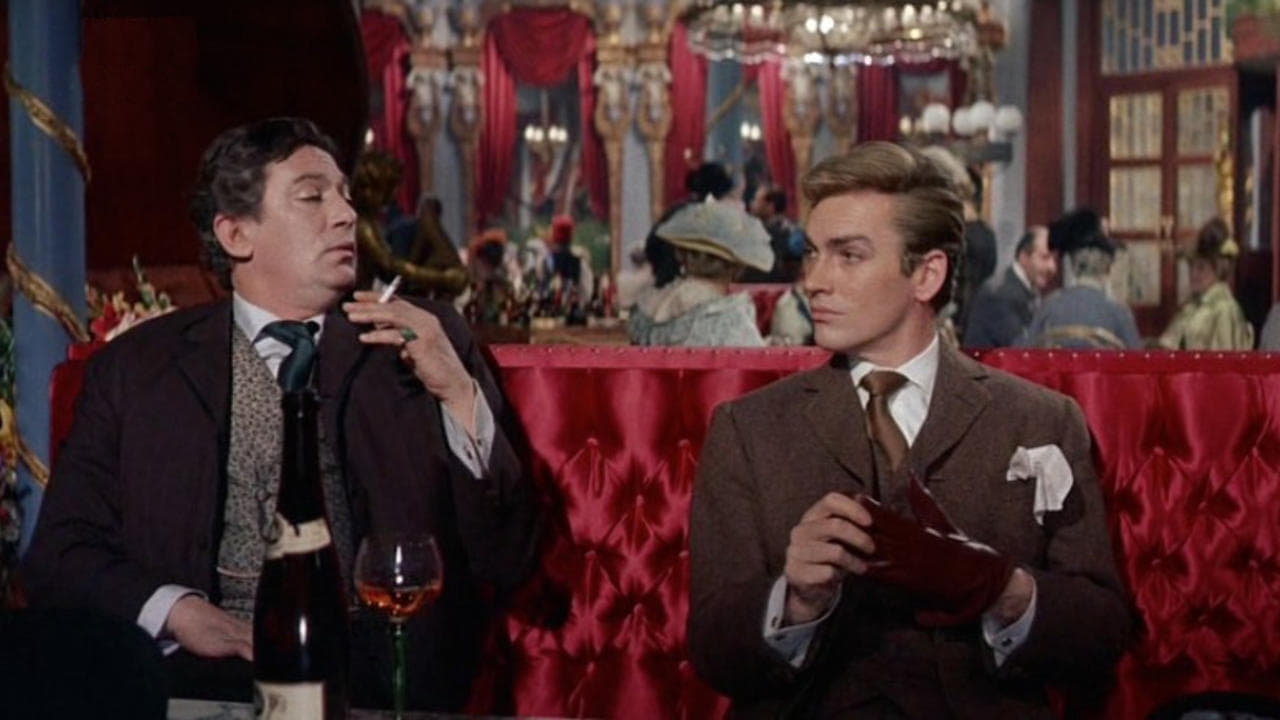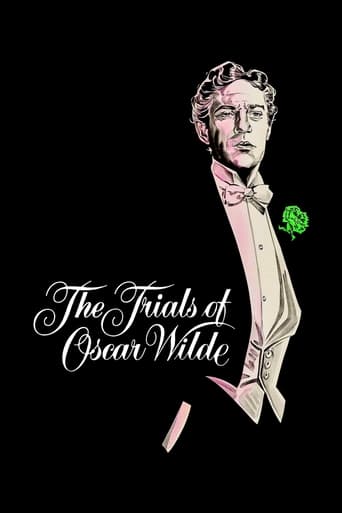Laikals
The greatest movie ever made..!
Ceticultsot
Beautiful, moving film.
Breakinger
A Brilliant Conflict
CrawlerChunky
In truth, there is barely enough story here to make a film.
HotToastyRag
I initially rented The Trials of Oscar Wilde because it was James Mason's time as Star of the Week. Somehow, in the 1960s, he got second billing in a bunch of movies but was only in them for fifteen minutes. Long before James even showed up, I realized this was a very high quality movie, one that was going to be enjoyed instead of just being useful.Peter Finch played Oscar Wilde, and he gave an incredible, fantastic, multi-layered performance that, of course, was completely ignored by the academy. Thankfully at the BAFTAs, he won Best Actor, and the film was nominated for picture, screenplay, and supporting actor. Back in 1960, it was a big risk to play a homosexual, and Peter treated the role with dignity and much more motivation than plain flamboyance. This is an internal performance, one that shows years of pain underneath the famous quips. If you like to laugh at Oscar Wilde's barbs, or if you like over-the-top parodies of gay characters, rent the remake Wilde. For a more realistic interpretation of the emotional turmoil of a gay man in the 1890s, rent this one.The story is pretty upsetting to watch, mostly because it's not possible to slough off afterwards and tell yourself it's only fiction. This is a true story and shows the horror and hatred of human nature. Don't pop this in for a fun-filled movie night; watch it when you're in the mood for a very heavy drama.
ianlouisiana
One should always consider the possibility that had Oscar Fingal O'Flaherty Wills Wilde not fallen inconveniently in love with Lord Alfred Douglas he might now be remembered only as a relatively minor Irish playwright with a propensity for presenting other people's bon mots as his own.His ascent to his unassailable position as the Theatre's great gay martyr is at least to some extent the result of his treatment at the hands of the British judicial system. As unpleasing as it may be to sophisticated 21st century thought,the "homosexual act" -as gay love was referred to in Victorian law books - was considered a crime and the "abominable crime of buggery" was punishable by Life Imprisonment.Queen Victoria refused to endorse laws proscribing Lesbianism because she not only had never heard of it but she refused to believe its existence.Aware of all those facts Oscar Wilde chose to sue his lover's father for libel after the Marquess of Queensberry referred to him as a "somdomite" (sic).It says much for his chutzpah if not his intelligence. Mr P.Finch is a fine,sensitive if rather louche Oscar,clearly besotted with the pretty but insubstantial John Fraser.Mr L. Jeffries pushes the boat out a bit as the Marquess of Queensberry,very much an aristocrat of his time with a zealot's hatred of homosexuality as only an old public school man can have.Mr J.Mason is suitably ruthless as his barrister,cold of heart,tongue and eye. This is a handsome film,a typical superior British product of its era, requiring its audience to stay awake and keep off their mobile phones. If you require an instant fix it isn't for you. Wilde may ultimately have been a victim of his own ego,but the Marquess of Quennsberry must be spinning in his grave over his own contribution to his old enemy's immortality.
bkoganbing
Peter Finch gives a top drawer performance in the title role of the Trials of Oscar Wilde. It's the story of a man who was a celebrity raconteur and playwright and his fall from grace because of Victorian mores about homosexuality.Today a man like Wilde would not be compelled as Victorian society did compel homosexuals to marry and have children and deny to the world who they were and how they love. Just think that a century later after the controversy surrounding Wilde, we are discussing gay marriage and it's being legalized in many countries. Wouldn't it have all been simpler if Oscar had been allowed to marry Bosy.When the film opens Wilde is already a successful author of many plays and stories and maybe the most quoted man of wit in his time. He's married with two children, but he's got a side life as a gay man. He's got to take his partners where he finds them, a lot of street kids for the most part. And then he falls head over heels for Lord Alfred Douglas played by John Fraser. Fraser is the son of the Marquis of Queensbury, the same guy who thought up the rules for prize fighting. He's a rough and crude man played with relish by Lionel Jeffries. Of course the thought of a gay son is an abomination to him. Can't be that young Bosy is gay, it's that Wilde guy he's hanging out with.Queensbury calls Wilde a "sodomite" and Wilde foolishly decides to sue him for libel. And then the trials take place, first the civil suit and then the criminal trial because sodomy was indeed a criminal offense back in the day.I often wonder why the real Wilde did not just deal with Queensbury in one of his plays. In real life and in the film Queensbury was a boorish lout who could have so easily been caricatured and laughed out of relevancy. Queensbury retained as his attorney Edward Carson, maybe the best barrister of his day. Later on he led the Ulster contingent in Parliamant and was probably the man most responsible for those six counties of Northern Ireland remaining in the United Kingdom.Let's just say that Oscar Wilde uttered one witticism too many during his time on the witness stand and James Mason who gives a great performance as Carson just moves in for the kill. With an international gay movement in full swing now Oscar Wilde and his story may seem quaint to some, but it is relevant today to show that it wasn't that long ago that being who you were was a crime. And a reminder of where gay/lesbian/bi-sexual/transgender folks will be if our hard won rights even as incomplete as they are yet are ever allowed to recede.
pekinman
Ken Hughes film 'The Trials of Oscar Wilde' may at first appear to be one of those cheesy Technicolor costume dramas when in fact it is a gripping and finely acted account of the appalling treatment Oscar Wilde received at the hands of the English justice system at the end of the 19th century.Peter Finch is superb as the eponymous hero and is totally committed to the role and turns in one of his best performances on screen. The supporting cast is also quite good if more generalized in their characterizations, more a fault of the screenplay than the performers. There is one especially fine supporting performance from Lionel Jeffries as the maniacal Lord Queensbury. Jeffries plays Queensbury as a crazed brute, a type of man we can no longer countenance in these days, though I suspect they are still out there waiting for their chance to pounce on those who they fear and do not understand.Sonia Dresdel is Lady Wilde, Oscar's dotty mother at the end of her life. It's a small part but is quietly powerful. Other people in Wilde's life, Constance, his wife, and Ada Leverson, his stalwart friend and life-long supporter, are tantalizingly glimpsed but little is revealed of their inner workings. But this isn't a film about them but about the actual trials and much of the film is spent in courtrooms. This might sound boring but it isn't.James Mason appears in the first trial as the defending witness, for Lord Queensbury, and a more vicious, narrow-minded lawyer could hardly be found, even these days.The technical credits are competent if nothing special; the music, melodramatic in a soap-opera-ish way, the sets plush and too clean. But somehow the power and tragedy of Wilde's story comes through all the gilding of the script, peppered with some of Wilde's wiser quotes, well-placed, naturally, in the text. There is nothing preachy or moralistic which is a relief, compared to the highly politicized scripts being written since this film was made.It is interesting to note Nicholas Roeg as the camera operator. He wasn't the cinematographer but I detected a few Roeg-ish touches in a couple of the more meditative scenes.This is not a film to be sluffed off as old-fashioned simply because there are no sex scenes or vulgar language or violence. The psychic violence suffered by Oscar Wilde was quite sufficient enough and this is a memorable film, worth having in the collection.

